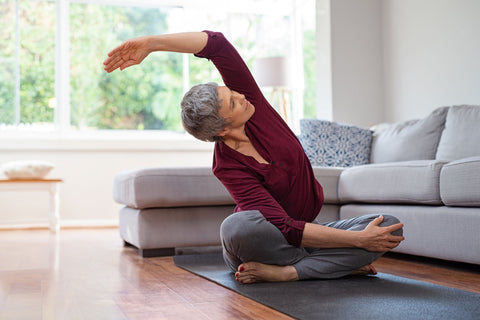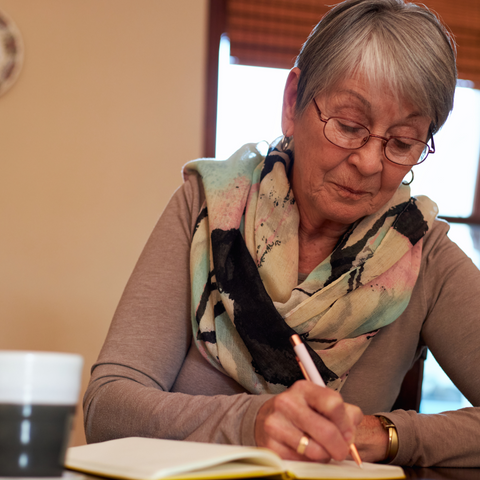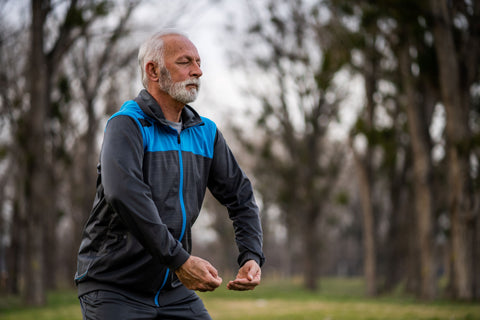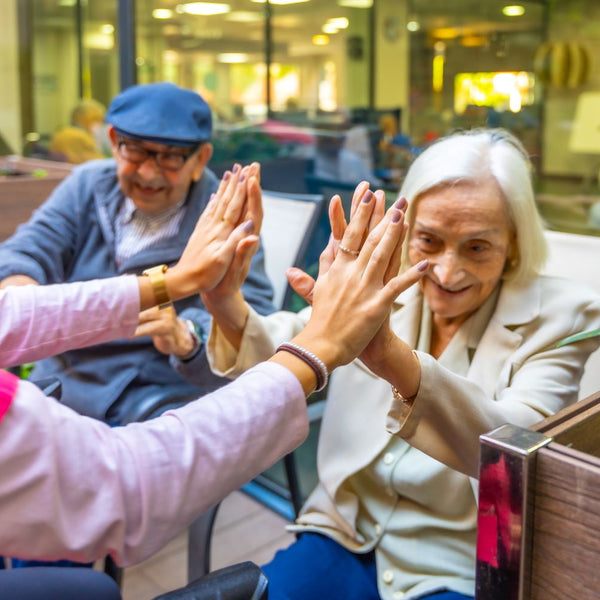Mindfulness isn’t necessarily a concept that all older adults will be familiar with, but taking part in activities that help people to focus on the here and now can bring benefits to everyone, especially the elderly.
In this article, we look at what mindfulness is, what the potential benefits are and why older people specifically can find it useful. We also list various mindfulness activities that seniors might enjoy trying.
Jump to:
- What is mindfulness?
- Why are mindfulness activities beneficial for seniors?
- Links between mindfulness and healthy ageing
- List of mindfulness activities for the elderly
- Peace of mind with a personal alarm
What is mindfulness?

Mindfulness is a term used to describe having an awareness of the present moment rather than thinking about the past or the future or focusing on any of the stresses of everyday life. It can help people to manage thoughts that otherwise might feel overwhelming and to help with anxiety or stress in the elderly.
Why are mindfulness activities beneficial for seniors?
Things such as stress, anxiety and even loneliness are common in older adults. Mindfulness activities are not a cure-all for these things, but they could potentially include benefits for the elderly, such as:
- Helping them to process and accept their current situation
- Helping them to manage everyday stresses and emotions
- Helping them to experience clarity about things that are happening in life
- Helping with concentration and focus
- Helping to put effective sleep habits in place
Many seniors find that changes have to be made to life as they get older, and this can be difficult to deal with. It might be changes to health or mobility, the loss of a spouse, partner or friends, or not being able to live as independently as they used to. Practising mindfulness can potentially help older people to better process and manage these changes and the impact they have on them.
Links between mindfulness and healthy ageing
While research is still ongoing, some studies indicate that mindfulness activities may have a positive impact on cognition in the over 60s, including retaining memory functions.
Mindfulness is a tool used by many to help manage wellbeing and mental health, and activities incorporating mindfulness are recommended by many medical professionals as a way to help manage emotions.
Mindfulness is not an alternative to seeking medical attention for physical or mental health concerns, so the first port of call should always be your GP if you are worried about your health or wellbeing.
List of mindfulness activities for the elderly
We’ve compiled a list of activities that many older people might like to try, which incorporate mindfulness. The same kinds of activities won’t suit everyone, so having a few different things to try out can be a good idea.
Meditating
Meditating is taking a few moments of silence and solitude to set aside any thoughts or worries and focus on the here and now. It usually involves taking controlled and calm breaths, which can help clear the mind of distractions.
Many people find that doing guided meditations is a great place to start. Home voice assistance devices often have this function built in, so an elderly person with one of these can simply ask it to read out a guided meditation.
Spending time in nature for mindfulness
Spending time in nature in itself isn’t necessarily a mindfulness activity, but there are ways to incorporate mindfulness into the great outdoors that can be really helpful to some people. For example:
- Simply observing the landscape for a while
- Watching birds or other wildlife
- Listening and identifying individual sounds of nature, such as birdsong, leaves moving in the breeze, acorns hitting the ground, livestock in a nearby field etc.
- Watching clouds in the sky.
Mindfulness journalling

Many people have journalled at some point in their life. Some may have kept a diary where they wrote about events, thoughts and experiences, while others may have written in a journal at various points.
Mindfulness journalling, also sometimes called reflective journalling, is about writing down observations about what you are thinking and/or doing, without judgement or concern about what you are writing down or what it means. This can help the person journalling to find some perspective on things that they feel or are experiencing. Some good prompts to start journalling could include:
- Today, I feel…
- Today, I am grateful for…
- Today, I am worried about…
- Today, I want to achieve…
Jigsaws or brain games for mindfulness
Believe it or not, jigsaw puzzles can be an excellent mindfulness activity, because it means you are focusing your attention on what you are doing in the current moment, away from distractions. Many people find jigsaws relaxing for that very reason, as it provides a calm moment where the only thing that needs attention is finding the next piece that fits.
Along similar lines, brain games and puzzles can have a similar effect on those participating, alongside other benefits for older adults, such as maintaining or enhancing mental agility, memory and problem-solving skills.
Crafting and art for mindfulness
As with many of the other mindfulness activities in this list, creating something through craft can be a great way to set aside thoughts or worries and simply focus on what you’re doing right now for a period of time. Mindfulness crafting doesn’t need to be anything complicated. It could be colouring in a picture, doodling on a page, crocheting, practising calligraphy, cross stitching, model building or painting, along with many more different types of arts and crafts. Any activity that focuses your mind on what you are doing in that moment can be a mindfulness activity.
Mindfulness breathing exercises
Often forming part of meditation, mindfulness breathing exercises can be a great way to slow down, take a few moments to focus the mind and improve self-awareness. All of these things can help someone feeling stressed, anxious or overwhelmed.
Some simple breathing exercises include:
Connected breathing
In a seated position, with eyes closed, slowly breathe in and out, paying attention to the breath as it flows in and out of the body. Start with breathing in for a count of three, before breathing out on the same count. After a few deep and controlled breaths, try extending this to a count of four.
2-4 breathing
In a seated or standing position, breathe in deeply, through your nose, for the count of two. Exhale slowly, through the mouth, to the count of four. Repeat for up to five minutes.
Doing yoga, Tai Chi or balance exercises

Many older people start to notice that their balance perhaps isn’t as good as it used to be. This can increase the risk of having a fall, and can also result in a loss of confidence and mobility. Doing activities that can help maintain and improve balance can also have the benefit of being great for mindfulness too. The slow movements involved in yoga and Tai Chi can help reduce stress and improve overall wellbeing, as well as building flexibility and strength.
How to get help if you fall
A fall alarm will automatically call for help when it detects the wearer has fallen. A fall alarm or emergency button with fall detection can provide reassurance and peace of mind. Our Independent Living Advisors are available on 0800 085 7371 (Monday – Friday, 9am – 5pm).
The movements and poses can be adapted for those with limited mobility, making them ideal forms of exercise and activity for the elderly.
Many local communities have yoga, Tai Chi or other classes that elderly people are welcome to join, which can also provide a social aspect to the activity, if that’s of interest.
Peace of mind with a personal alarm
If you’re a family member or friend of an older adult who is living independently, it can be common for you to worry about them when you’re not there. If they are perhaps not as mobile as they used to be, have become more frail or have experienced a fall or accident in the past, you may want to consider a personal alarm system that suits their lifestyle.
This is a wearable alarm device that is designed for them to have on them in person at all times so that if there is an incident or fall, they can reach help by simply pressing the alarm button. There are lots of alarm features available on different devices so that you can find the one best suited to your elderly loved one’s lifestyle and preferences. For example, personal alarm systems designed to be worn out and about, with GPS technology so their location can always be found, or alarm systems suited for the home and garden, where falls and accidents may be more likely to occur.
If you’d like to find out more about our products and find the best option for someone you care about, get in touch with our team by calling 0800 085 7371.



